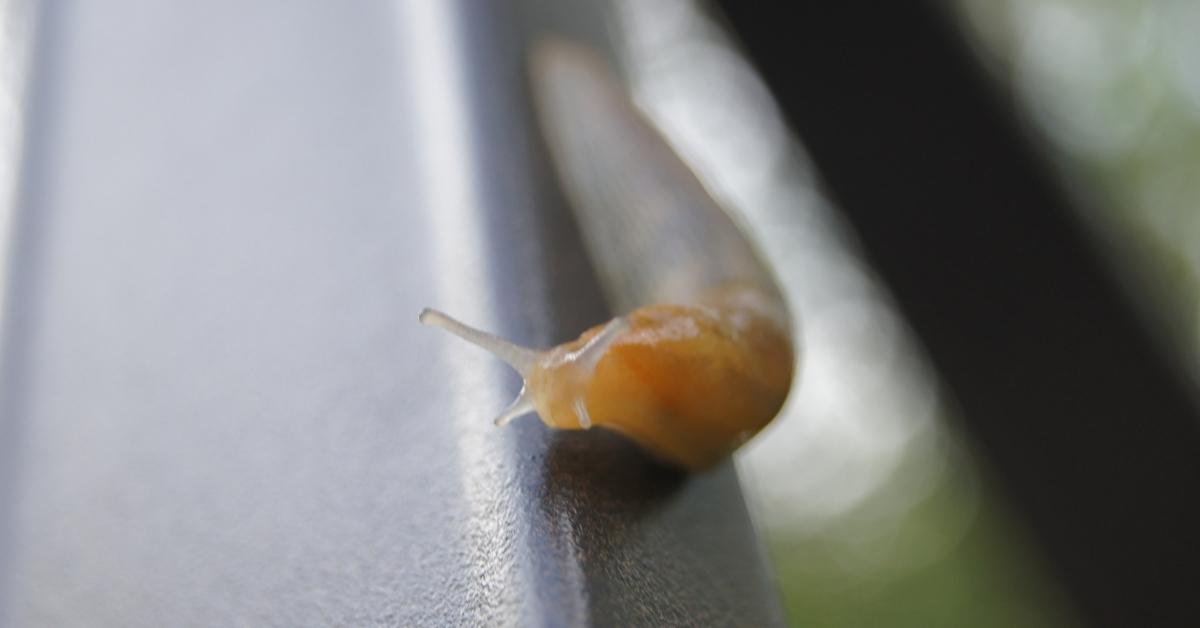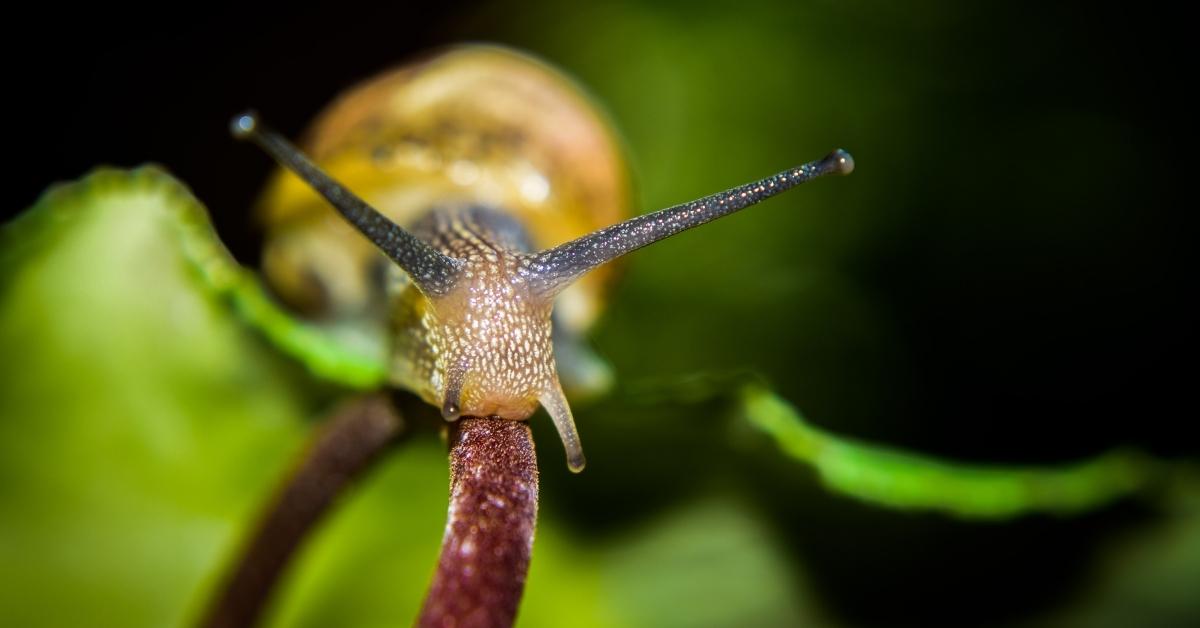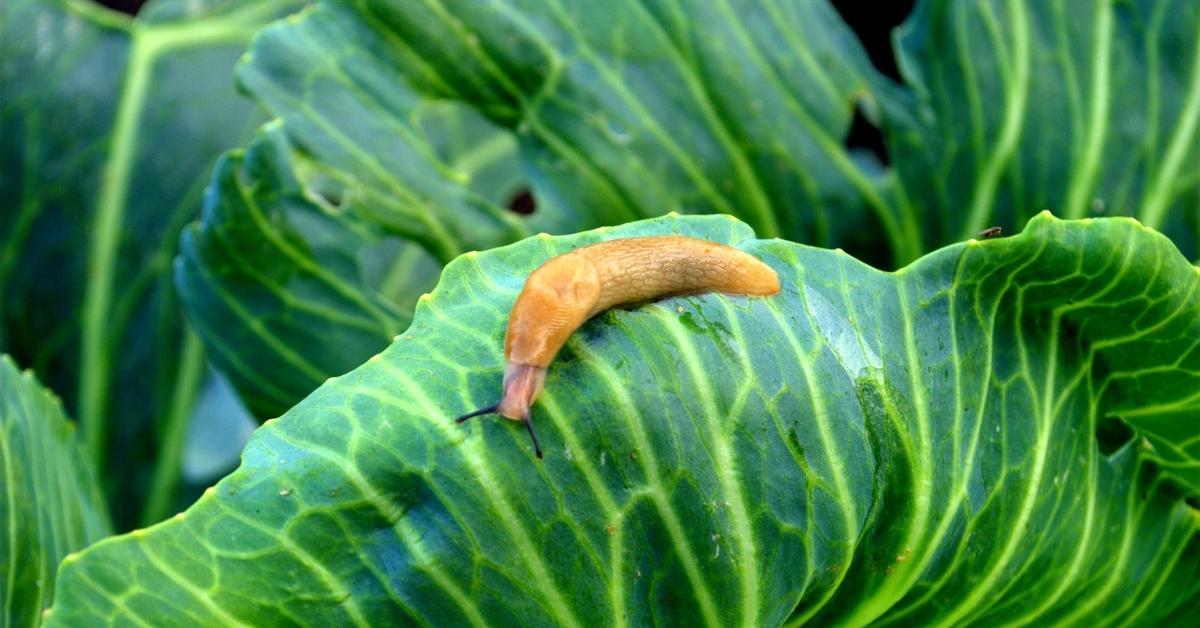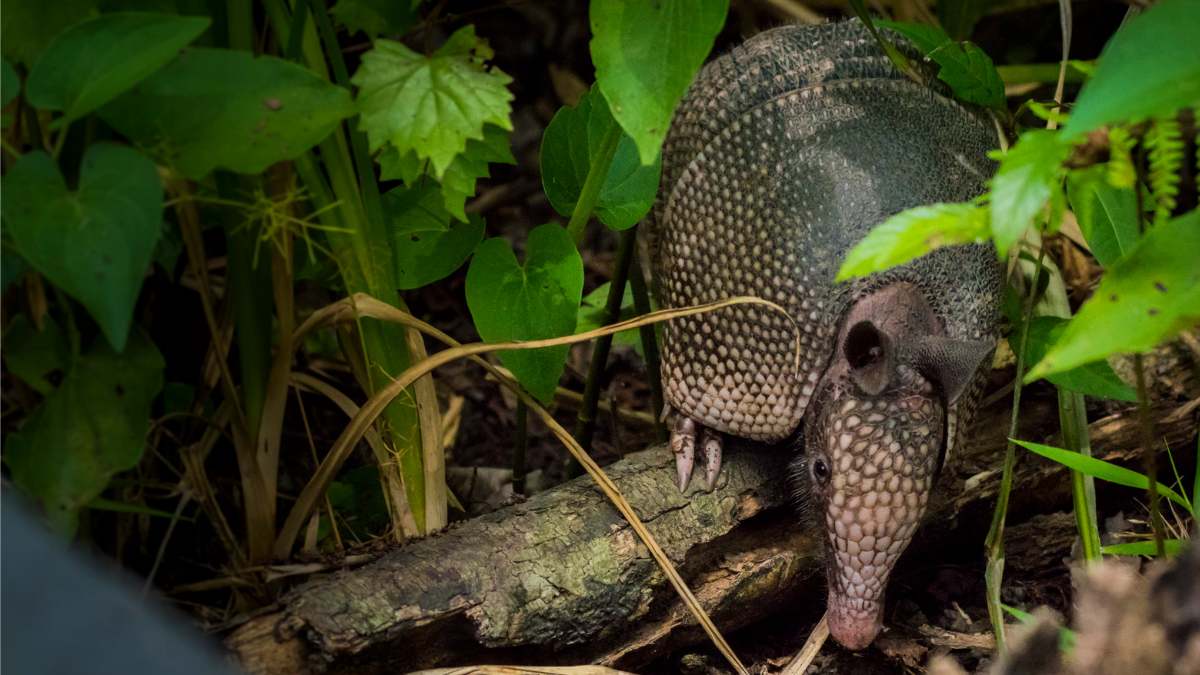Have you ever turned on your kitchen light at night to be confronted with slugs crawling around your kitchen floor and up your cupboards?
That’s precisely what happened to me last November, and after the initial shock, I set about getting rid of them. It took about of month of trial and error with different methods to banish them.
In this article, I’ll explain various ways of getting rid of slugs from your house and garden so you’ll no longer have to suffer the squelch underfoot when you pop downstairs for a midnight snack.
How to Identify Slugs and Their Damage
Slugs and snails are common garden pests that can cause significant damage to a variety of plants, especially during wet and cloudy weather. They feed at night or on overcast days, leaving behind large, ragged holes in leaves, flowers, and fruits. They also devour seedlings, leaving only a small stem or nothing at all.
Slugs and snails can be identified by their slimy appearance and the silvery trails they leave on plants and soil. They range in color from gray to brown to orange and can grow up to 3 inches long.
Slugs and snails can also climb up plants and trees, causing damage to citrus and other crops.
Slug Control: How To Get Rid of Slugs in the House

To begin the cleaning process, it is crucial to get inside the mind of a slug and understand how they operate. Think like a slug, and your halfway to getting off them!
What attracts slugs to your house
Slugs are creatures of the dark and the damp. They avoid sunlight and dryness as much as possible. That’s why they often sneak into your house at night, looking for food and shelter. They can survive in light and dry areas for a short time, but they always return to their wet and gloomy home.
Slugs are drawn to fruit and vegetable matter, whether it’s fresh or decaying. They will eat anything that’s organic and plant-based.
Make your house unwelcoming to slugs
So, the first thing you need to do is to make your house less hospitable to slugs. If your home suffers from dampness, get it treated by specialists as soon as you can. In addition, give your house a thorough clean to ensure there is no decaying matter that could be a feast for a slug (I found under the fridge to be a prime example of a slug’s banquet).
Batten down the hatches
Next, try to establish how the slugs are getting into your home. Start from the location where you’ve seen the largest concentration of slugs and look for holes, cracks, and crevices in the exterior. Is there an exterior wall? Are there any air bricks/vents? Any holes in the outside for pipes or cables?
These are all questions you should be asking yourself as you search for the slugs’ way in.
If any slug slime trails are visible, you may get some clues as to where they are coming from by following them.
When you make a discovery, seal it up by repairing any damage or filling it with expandable foam. It may seem obvious to most, but I should point out that you shouldn’t block your air vents! Purchase a new air vent that slugs can’t get through and replace it.
How to terminate Slugs?
There are several ways to kill slugs that are inside your property, and I’ve put together a list of my top three here:
- Beer Trap: Layout a bowl of beer and leave it overnight near your house area that the slugs frequent. Mr slug will be attracted to it (after all, beer is essentially rotting matter, which slugs love), fall into the liquid, and drown. You can also purchase specially designed slug traps.
- Dehydrate with Salt: Sprinkle patches of salt around the infested area. Slugs and salt don’t mix, and you’ll wake up in the morning to find lots of dead slugs.
- Slug Pellets: These didn’t work for me at all, but I’m giving them a mention because they worked well for a couple of my friends – they used these slug pellets.
How To Get Rid of Slugs in Garden Organically and Pet-Friendly?

Slugs can be a nuisance for any gardener, as they can damage your plants and crops by eating their leaves, stems, and fruits.
However, not all methods of slug control are safe for your pets or the environment. Some slug baits and pesticides can be toxic to animals and pollute the soil and water.
That’s why in this section, you will discover some of the natural and pet-friendly ways you can get rid of slugs from your garden. These methods are effective, affordable, and easy to apply. They will help you protect your plants from slugs without harming your pets or the planet.
Water Your Plants In The Morning
Optimal Watering Time and Technique Watering your garden in the morning is the best way to deter slugs, as it allows the soil to dry out before the nocturnal creatures become active. Slugs can glide easily on wet soil, but they struggle on dry and rough surfaces. Water the roots directly, rather than sprinkling water from above, to prevent creating a moist environment for slugs on the leaves, flowers, and fruits of your plants.
Use Eggshells to keep slugs away
Method: Break up eggshells and scatter them around the perimeter of your plants.
Slugs have soft and delicate bodies, so they avoid crawling over anything that can cut or scratch them. Eggshells have sharp edges that can hurt slugs, so they act as a natural barrier. However, although it is a widely known solution, this method is not very reliable, as I have never heard of anyone who successfully used it to repel slugs.
Use Diatomaceous Earth to deter slugs
Method: Create a barrier of diatomaceous earth around the perimeter of your plants.
Diatomaceous earth is a natural powder made of microscopic fossilized algae. It looks like fine sand, but it has tiny sharp edges that can cut and scrape the soft body of any slug that dares to cross it. Slugs will avoid diatomaceous earth because it can cause them to lose moisture and bleed. It is an effective and organic way to protect your plants from slugs.
Slug Removal by hand
Method: Remove slugs from your garden by hand (especially after a shower of rain)
This may sound simple, but it is actually one of the most effective ways to get rid of slugs. Slugs are more active and visible when it’s moist, so you can easily spot them and remove them from your garden. You can use gloves, tweezers, or a spoon to pick them up and dispose of them.
You can also use a flashlight to find them at night. This method requires some patience and diligence, but it can reduce the slug population significantly.
Using Slug Pellets
Method: A scattering of slug pellets around your garden
Slug pellets are a popular product that can kill slugs quickly and easily. They contain a chemical that poisons slugs when they eat them. However, they also have some drawbacks. They can harm other animals that may eat the pellets or the dead slugs, such as birds, hedgehogs, dogs, or cats.
They can also be dangerous for young children who may accidentally ingest them. Therefore, you should use slug pellets with caution and follow the instructions carefully.
Take Advantage Of Predators
Method: Introduce slug-eating ducks or chickens to your garden or create a habitat that will attract other predators
One of the best ways to get rid of slugs is to let nature do the work for you. Ducks, chickens, and other birds are natural enemies of slugs, and they will happily gobble them up. You can raise poultry in your garden or invite birds to visit with a feeder. Other creatures that prey on slugs include hedgehogs, frogs, toads, beetles, and centipedes. You can make your garden more appealing to them by providing shelter, water, and food sources.

Porridge
Method: A scattering of porridge oats around your slug’s habitat. It is one of the most unconventional methods to get rid of slugs is to use porridge oats.
You can scatter some porridge oats around the places where slugs like to hide or feed, such as under pots, near plants, or along the edges of your garden. Slugs are attracted to the oats and will eat them, but this will prove fatal for them.
The oats will swell up in their stomachs and cause them to burst or dehydrate. This method is supposed to be cheap and easy, but I have never tried it myself. I’m not sure how well it works or how humane it is. If you have any experience with this method, please share it with me. I’m curious to know if it really works.
Beer Trap
Method: Bury a jar/bottle in your garden and fill it with beer. This is one of the most popular methods to get rid of slugs is to use a beer trap.
You can make a beer trap by digging a hole in your garden and placing a jar or a bottle in it. The rim of the jar or bottle should be level with the ground. Then, fill the jar or bottle with beer, preferably a cheap and strong one.
Slugs are attracted to the smell and taste of the beer, and they will crawl into the trap. However, they won’t be able to get out, and they will drown in the beer. This method is effective and easy to set up, but you will need to replace the beer regularly and dispose of the dead slugs.
Vinegar Slug Control
Method: Spray vinegar on slugs or on the areas where they are found.
Vinegar is another substance that can kill slugs by dehydrating them. You can use any type of vinegar, but white vinegar is the cheapest and most common. You can spray vinegar directly on slugs or on the surfaces where they crawl, such as the floor, the walls, or the pots.
Vinegar will also deter slugs from coming back, as they don’t like the smell or the taste of it. However, vinegar can also damage your plants, so be careful not to spray it on them. Vinegar can also irritate your skin and eyes, so wear gloves and goggles when using it.
The Best Way To Get Rid of Slugs
I’ve outlined some methods you can use to try to combat the nuisance of slugs. The ones you choose to try will depend on n factors such as your budget, whether you want an organic solution and how much time you have. There is no “best way” to get rid of slugs as something that works for you may not work for someone else – it is often a case of trial and error.
If you have any slug-killing techniques that you’d like to share, I’d love to hear them. Please email me with your suggestions. I’d also be interested in any other constructive comments that could make this webpage better.
Conclusion
In conclusion, slugs can be a real problem for your house and garden, as they can damage your property and plants. However, there are many ways to get rid of them, both inside and outside your home. You can use natural and pet-friendly methods, such as eggshells, diatomaceous earth, hand-picking, predators, or beer traps.
You can also use chemical methods, such as salt or slug pellets, but be careful of the potential harm they can cause to other animals and children. The best way to get rid of slugs depends on your situation, budget, preference, and time.
You may need to try different methods until you find the ones that work for you. I hope this article has helped you learn more about how to get rid of slugs. If you have any questions, comments, or suggestions, please feel free to contact me. I would love to hear from you.
FAQ
How do I permanently get rid of slugs?
Permanently getting rid of slugs is not easy, as they can reproduce quickly and hide in many places. However, you can reduce their population and damage by using a combination of natural and chemical methods. You should regularly inspect your garden and house for slugs and remove them by hand or with traps.
You should also create barriers around your plants with materials that slugs dislike, such as copper, gravel, or wood ash. You can also apply slug pellets or nematodes to kill slugs in the soil, but be careful not to harm other animals or plants. Finally, you should encourage natural predators of slugs, such as birds, frogs, toads, or hedgehogs, by providing them with food, water, and shelter.
How can I prevent slugs from entering my house?
You can prevent slugs from entering your house by making it less hospitable to them. You should treat any dampness issues, clean your house thoroughly, and seal any holes, cracks, or crevices in the exterior. You should also remove any fruit and vegetable matter that could attract slugs.
What are some drawbacks of using salt or slug pellets to kill slugs?
Salt or slug pellets are chemical methods that can kill slugs quickly and easily. However, they also have some drawbacks. They can harm other animals that may eat the salt or the pellets or the dead slugs, such as birds, hedgehogs, dogs, or cats. They can also be dangerous for young children who may accidentally ingest them. Therefore, you should use salt or slug pellets with caution and follow the instructions carefully.
What kills slugs naturally?
Nematodes are the most effective natural method for eliminating slugs; to use them, simply wet the soil around your plants and let them do their job. Salt has a natural ability to kill slugs, but it takes a lot of salt to do it, and you shouldn’t apply it anywhere near your plants. Beer traps and vinegar sprays are two more natural approaches that may be used to eradicate slugs.
Why do I have so many slugs?
You may have so many slugs because of the weather, the soil, or the plants in your garden or house. Slugs thrive in moist and humid conditions, so they are more active and abundant during rainy seasons or in damp areas.
Slugs also prefer rich and organic soil, as it provides them with food and shelter. Slugs are attracted to certain plants, especially those with soft, succulent, or decaying leaves, such as lettuce, cabbage, strawberries, or hostas. Therefore, you should check the weather, the soil, and the plants in your garden or house to see if they are favorable for slugs.

